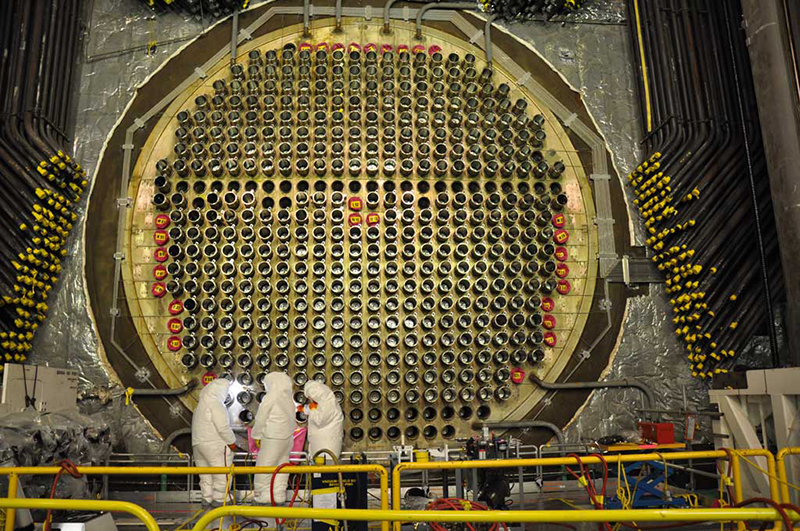Who cares if SMRs make more or less, or different used fuel than large reactors, none of its a problem anyway.

Sometime ago CNS members may have seen articles about the publication of the report on wastes from Small Modular Reactors. Nuclear waste from small modular reactors | PNAS. As we are scientists and engineers we may have focused on the technical issues and some of the assumptions made in the report that we would argue are actually wrong. Some rebuttals have already taken place.
But as well as being scientists and engineers we are also nuclear communicators and in fulfilling that role we need to consider how the public and politicians might see the issues when they have very little appreciation of the technicalities.
Standing back from the detail we have to accept the fact that few people outside of the industry really understand the issues and so correcting the assumptions made in the report has very little effect on them. However, the act of ardently refuting the report may actually reinforce the idea that nuclear wastes are a horrible problem. After all, why would we be so concerned about the report if they weren’t. In other words, refuting the report might satisfy our technical sense of justice but is likely to have an adverse effect on people’s view of the technology. Its counter intuitive I know but communications often are.
The real point that we should be communicating to people is the fact that the used fuel from nuclear power production is not actually causing any real problems, and they can all be managed safely in the way that we have safely managed them for many decades and that, if we are allowed to build a repository, will never have an adverse effect even in the unlikely event that society has collapsed.
Whether future reactors, full-scale or SMRs, make more or less of something that is not actually a problem and is a complete irrelevance even if it were to be true! The complete fuel cycle options, including permanent disposal of used fuel and radiological waste, for advanced Generation IV reactors are being finalized with the deployment of the new fleet of reactors under the scrutiny of the national regulators and international regulatory agencies. Information on these can be found in the G4SR conferences proceedings now available on the CNS Website (https://www.cns-snc.ca/cns-proceedings-archive/).
Looked at in another way this report is an opportunity to discuss the positive aspects of nuclear power and the contribution it can make to the sustainability of our planet, placing the waste issue in the context of the consequences of other energy systems that we might use, all of which have environmental issues. This approach will paint nuclear power in a positive light.
An interview with the lead author of the report concluded with the statement “So I think, SMRs can be deployed safely, as long as the back end is being managed responsibly. But in countries where that’s not the case, I think it’s a bit more like the Wild West”. Canada is not the wild west where nuclear waste is concerned (and that is confirmed as no harm has ever been caused by the storage of used fuel in Canada and the safe storage is continuously monitored on all sites). Armed with this information we can show that the lead author of the report is effectively supporting SMR deployment in Canada. And that in turn shows that the anti-nukes using the report to attack SMRs are not using the report correctly.
The following is a very helpful response along these lines that has been posted by the CNA. the reactor: will SMRs really produce more waste? (mailchi.mp)

2 responses to “Who cares if SMRs make more or less, or different used fuel than large reactors, none of its a problem anyway.”
I am disappointed to see a move towards American design and away from the traditional CANDU with its use of natural uranium fuel. When I hear the term “nuclear waste”, I see more than the need to contain it. Once we glassify irradiated fuel (all its residual uranium and plutonium) we are locking in hideous inefficiency: the use of 1% of its original uranium. It has never sat well with me that, based on economics, we have been prepared to live with that. The Moltex SMR to be deployed in New Brunswick holds out the hope of using that irradiated fuel. That gave me hope, for a while, that Canadian technology would maintain its distinctive path with, among features, would get more; much more from fuel mined.
I have also wondered, how the economics of the “bung up the hole” approach was established. Did someone compute the cost of creating unnecessarily pure plutonium and then mixing it in with “depleted uranium”? I understand that Moltex will use the residual uranium and transuranics as is. If it is successful, only the fission products will have to be glassified and a much higher utilization than 1% will be routine. Our entire irradiated fuel stockpile would also become valuable as well as the technology to use it.
I hate seeing U.S. designs getting a toehold here (at Darlington). What a disappointment!
Thomas, Its great to hear from you and I am sure many proud Canadians will initially share your disappointment.
The good news is that Canada has 3 stream program for SMRs that embraces both the BWRX-300, as an early deployment, and the development of technologies like that of Moltex and ARC so that they can be deployed when they are available. And it is becoming increasingly obvious that both Canada and the world will need more full-scale reactors and Canadian companies own 2 of the top 4 western large reactor platforms (The CANDU PHWR and Westinghouse’s PWR platform) so we will remain a first tier nation there as well. And the Darlington project will give our supply chain better access to the BWR markets as well.
So there is much to be optimistic about!
The key issue for all of us is to get people to understand that managing used fuel is not the challenge that some people make it out to be so that decision makers can make decisions based on fact and not on unrealizable fears.